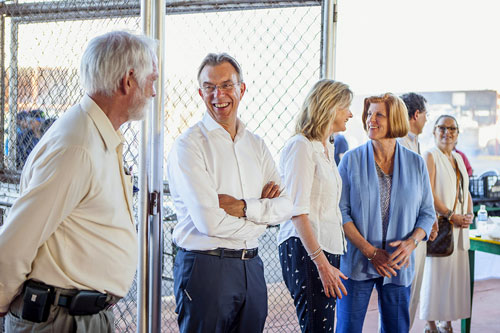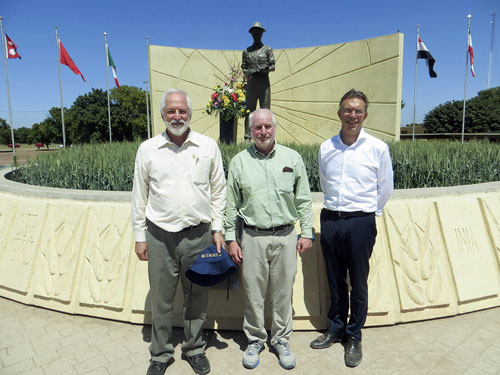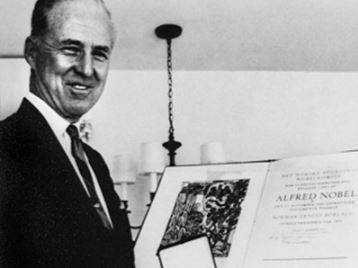
CIUDAD OBREGON, Mexico (CIMMYT) — Martin Kropff, who will take the helm as director general of the International Maize and Wheat Improvement Center (CIMMYT) in June, joined scientists, and other members of the global wheat community at the CIMMYT experimental research station near the town of Ciudad Obregon in Mexico’s northern state of Sonora for annual Visitors’ Week.
Following a tour of a wide range of research projects underway in the wheat fields of the Yaqui Valley made famous around the world by the work of the late Nobel Peace Prize winner Norman Borlaug, who died in 2009 at age 95, Kropff shared his views.
Borlaug led efforts to develop high-yielding, disease-resistant, semi-dwarf wheat varieties in the mid-20th century that are estimated to have helped save more than 1 billion lives in Pakistan, India and other areas of the developing world.
“I’m very impressed by what I’ve seen in Obregon,” said Kropff, who is currently chancellor and vice chairman of the executive board of Wageningen University and Research Center in the Netherlands.
“From the gene bank in El Batan, the breeding and pre-breeding and the work with farmers on a huge scale, it’s extremely high quality and innovative,” added Kropff, who with his wife Nynke Nammensma also visited CIMMYT’s El Batan headquarters near Mexico City earlier in the week.
“The MasAgro program is very impressive because it takes the step of integrating scientific knowledge with farmers’ knowledge – it’s a novel way to aid farmers by getting new technology working on farms at a large scale. It is a co-innovation approach,” Kropff said.
The Sustainable Modernization of Traditional Agriculture, led by country’s Secretariat of Agriculture, Livestock, Rural Development, Fisheries and Food (SAGARPA) and known locally as MasAgro, helps farmers understand how minimal soil disturbance, permanent soil cover and crop rotation can simultaneously boost yields and sustainably increase profits.
“The program is an example of how farmers, scientists and other stakeholders can think about and create innovations through appropriate fertilizer applications, seed technologies and also through such instruments as the post-harvesting machines,” Kropff said.
“This is fantastic. That’s what the CGIAR is all about.”

“The HarvestPlus program, which adds more zinc and iron into the crop through breeding, also plays a key role in CIMMYT’s research portfolio,” Kropff said.
Zinc deficiency is attributed to 800,000 deaths each year and affects about one-third of the world’s population, according to the World Health Organization. Enhancing the micronutrient content in wheat through biofortification is seen as an important tool to help improve the diets of the most vulnerable sectors of society.
The climate change adaptation work he observed, which is focused on drought and heat stress resilience is of paramount importance, Kropff said.
Findings in a report released last year by the Intergovernmental Panel on Climate Change state it is very likely that heat waves will occur more often and last longer throughout the 21st Century and that rainfall will be more unpredictable.
Mean surface temperatures could potentially rise by between 2 to 5 degrees Celsius or more, the report said.
“To safeguard food security for the 9 billion people we’re expecting will populate the planet by 2050, we need innovations based on breeding, and solid agronomy based on precision farming,” Kropff said.
“There’s no other organization in the world that is so well designed as the CGIAR to do this type of work. CIMMYT is the crown jewel of the CGIAR together with the gene banks. No other organization can do this.”
“We’ve done a lot of work in getting higher yields, but not much through increased yield potential, and that’s what we have to work on now,” he added.
“If you raise the yield through agronomy, you still need to enhance yield potential and there’s very good fundamental work going on here.”
“The partnerships here are excellent – scientists that are here from universities are as proud as CIMMYT itself about all the work that is being done. I’m really honored that from 1 June, I have the opportunity to be the director general of this institution. I cannot wait to get started working with the team at CIMMYT and I’m extremely grateful for the warm welcome I’ve received – a smooth transition is already underway.”
Follow Martin Kropff on Twitter @KropffMartin
 Gender equality, youth and social inclusion
Gender equality, youth and social inclusion 
